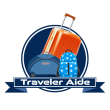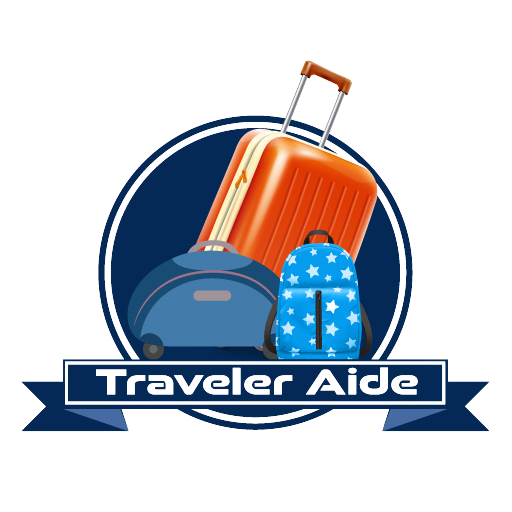Have you ever worried about your luggage getting lost or Pick up Checked Bags On A Connecting Flight? You’re not alone. The rules and processes for checking bags are essential for a stress-free and easy travel experience. This guide will go over the ins and outs of handling your bags at the airport, giving you helpful information and tips to make getting to your connecting trip easier.
I will explore:
- Airport baggage handling procedures: Learn about the steps your luggage goes through from when you check in until you get to your destination, such as cleaning, loading, and moving it.
- Factors determining whether you need to collect your bags: Find out about the essential things to think about, like ticket information, locations, flight rules, and layover times.
- Strategies to minimize the risk of losing luggage: Use tried-and-true methods to ensure your things reach their target safely.
- Packing tips for connecting flights: Maximize efficiency and convenience by packing strategically for layovers and potential baggage collection.
Knowing the information and advice in this guide, you should be able to handle connecting planes without any problems and ensure your bag travel goes as smoothly as your trip.
First, I’ll discuss How to Take Care of Your Baggage at the Airport.
How to Handle Your Baggage at the Airport
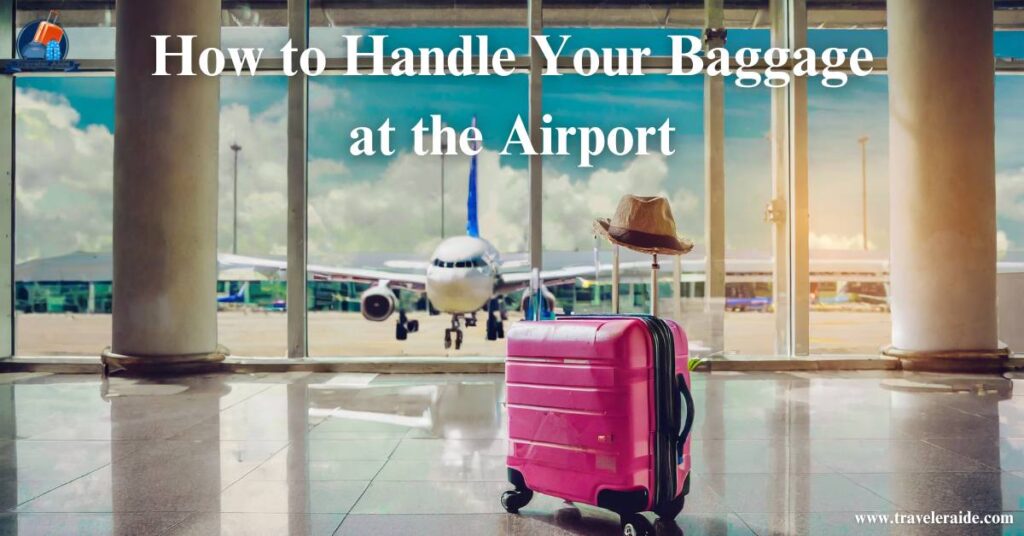
Transportation of bags through airports is a complicated process with many steps needed to ensure your bags reach their final destination safely. Here is a list of the most important steps:
1. Check-In
- Luggage Tagging: At the check-in desk, you’ll give your bags to someone from the airline. They will weigh your bags, make sure you are who you say you are, and give each item its barcode tag. The tag has information like the details of your trip and the airport where you’re going.
- Screening for Security: Your bags will be run through an X-ray machine for safety reasons. People will look through the bag some more if they find anything strange.
2. Conveyor System
- Sorting: When you’re done with security, your bags are put on a moving belt and taken to where they are sorted.
- Automatic Tag Reading: Scanners read the barcodes on your bags and send your items to the proper sorting bins based on information about your trip.
- Early, On-time, and Missed Bags: The system identifies your bag as “early,” “on-time,” or “missed” based on its arrival time compared to the scheduled departure time.
3. Loading Onto Aircraft
- Transfer to luggage Hold: Bags that arrive early or on time are moved to the airport’s luggage hold. Lost bags will be put on the next trip that can get you to your destination.
- Loading and Balancing: The ground team carefully puts the bags into the cargo hold of the plane while balancing them.
4. Arrival Airport
- Unloading: Taking the bags out of the cargo hold and bringing them to the luggage claim area happens when the plane gets to its destination.
- Collection: Your bags should be on the conveyor belt set aside for your trip. There is a baggage service office at the airport where you can report lost bags.
Tips For Travelers
- Get to the airport early so you have time to check in your bags and go through security.
- It’s essential to ensure that your bag has your name and contact information.
- Avoid losing or damaging essential things by putting them in your carry-on bags.
- Keep your baggage claim ticket safe and tell someone immediately if your bags are late or stolen.
Next, I’ll talk about six ways to figure out if you need to bring a checked bag on a connecting flight.
Six Ways To Determine If You Need To Take A Checked Bag On A Connecting Flight
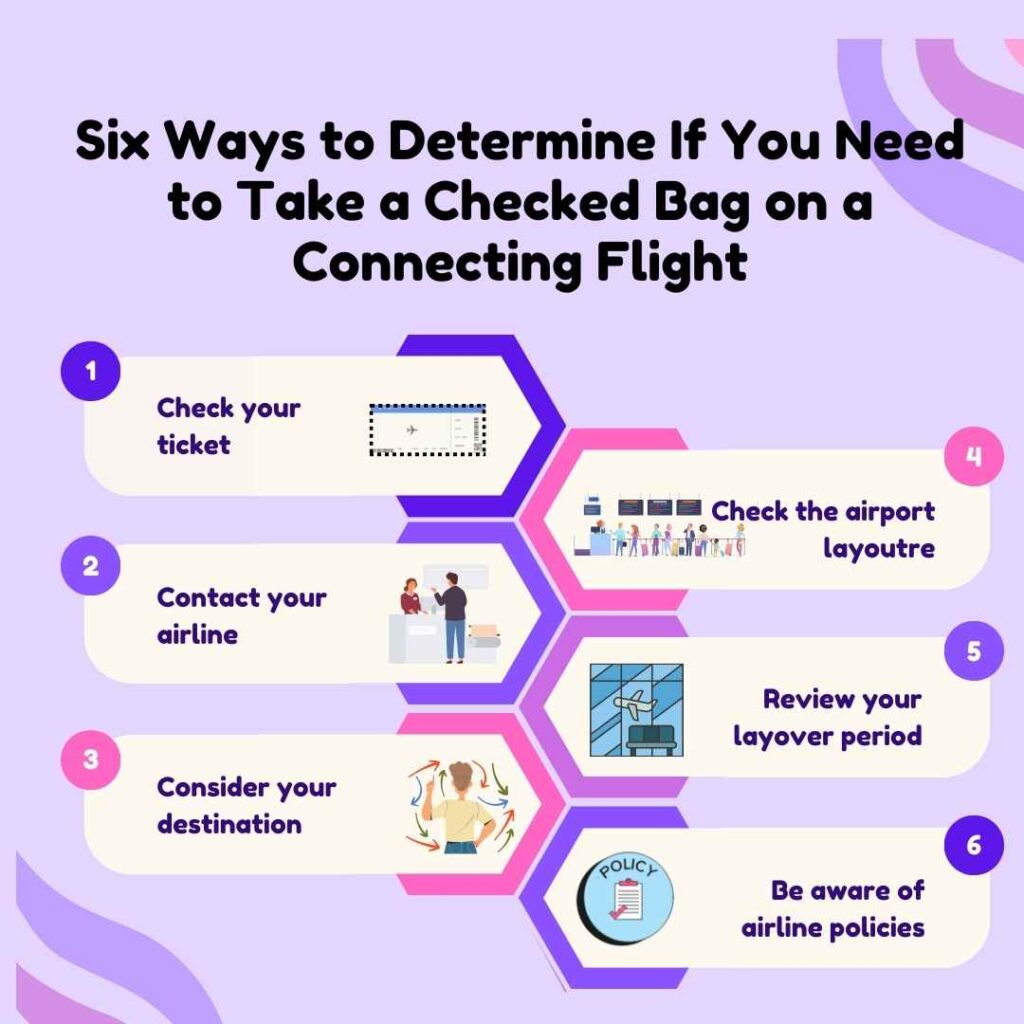
1. Check Your Ticket
Your ticket will usually tell you if your bags are checked at your end destination or if you need to get them and recheck them during your break. This is the most crucial step. Find words like “baggage allowance” or “baggage routing” to determine how your bags will be handled.
2. Contact Your Airline
Call the company directly if you need to check your ticket or have specific questions about your bags. What will happen with your bags on your particular itinerary? They can confirm that and give you any other information you need.
3. Consider Your Destination
For customs reasons, you may have to get your bags and recheck them at some places, especially foreign ones. It doesn’t matter if your trips are on the same ticket. To be ready, learn about the customs and rules of the place you’re going.
4. Check The Airport Layout
There may be more than one station or hall in bigger airports, so you may have to move between them while waiting. This can significantly affect your choice since getting around a big airport with checked bags may be challenging and time-consuming.
5. Review Your Layover Period
If your delay is shorter, it’s more likely that your airline will handle your bags quickly and get them to your connecting trip. But if you have a stay that lasts more than three hours, you should keep your bags with you during the delay, even if you must recheck them.
6. Be Aware Of Airline Policies
Every flight has rules about baggage costs, how much you can bring, and how to handle it. Ensure you know your flight’s regulations to avoid being surprised or charged extra at the airport.
Based on these things, you can choose whether to check a bag on your connecting flight.
Here Are Some More Safety Tips For Your Trip:
- If your checked luggage needs to be on time, put things like medicines and toiletries in your carry-on bag, just in case.
- You can check your airline’s website or call them directly to determine what size or weight limits apply to your checked bags.
- Give yourself plenty of time to get your bags and go through the recheck process, especially if you only have a short break.
- Think about how much it would cost to check a bag versus how useful it would be to have your bags with you during your stay.
Remember that talking to your flight is the best way to determine your best choice. Find out about the rules and regulations that apply to your trip.
Here are five things you can do to ensure you don’t lose your luggage.
Five Ways To Avoid The Risk Of Losing Luggage
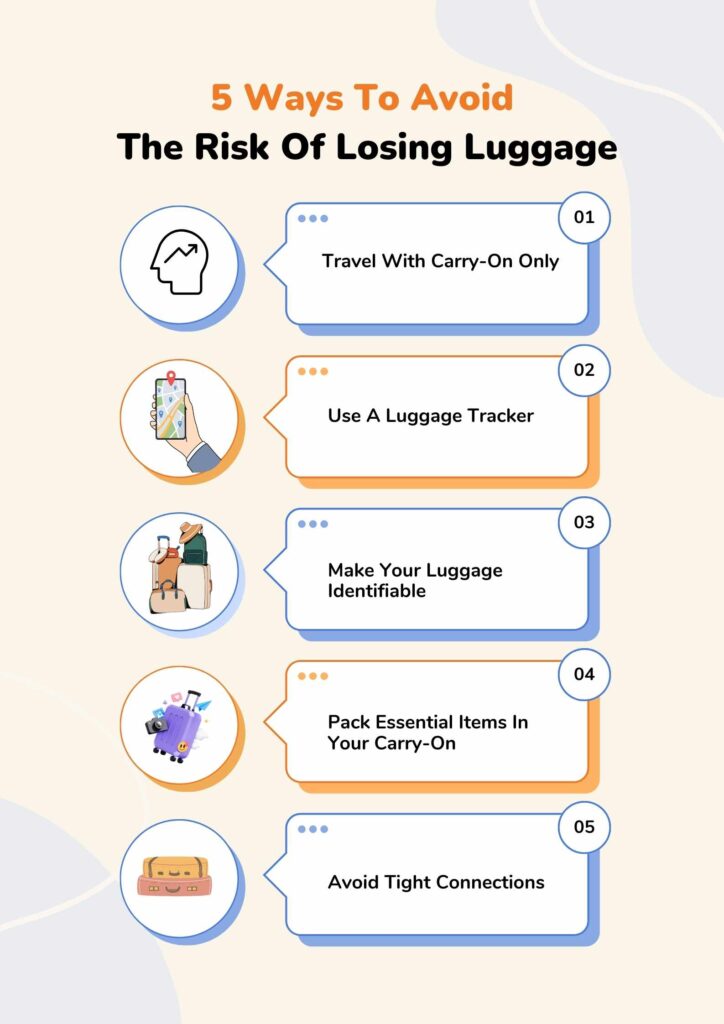
1. Travel With Carry-On Only
It would help if you did this to prevent losing your bags. One standard bag and one personal item, like a purse or laptop bag, are usually the two things you can bring. Use packing boxes, compact clothes, and travel-sized items to save space when you pack. If you need to, you could do laundry while you’re away.
2. Use A Luggage Tracker
If you lose your bag, smart travel tags or GPS trackers can help you find it. These trackers talk to an app on your phone and give you real-time information about where your luggage is.
3. Make Your Luggage Identifiable
Buy luggage that is a bright color or put unique tags and bows on it to make it stand out. Remove old stickers or tags from earlier trips to keep things clear.
4. Pack Essential Items In Your Carry-On
In your carry-on bag, you should always put your medicine, important papers, a change of clothes, and anything else you think is necessary. This way, you’ll still be able to get to your essentials if your checked bag gets lost or is delayed.
5. Avoid Tight Connections
Choose planes with extended layovers, especially if you need to connect to a different company or airport. This gives plenty of time for handling bags and lowers the chance that your bags will get lost or left behind.
Applying these tips can significantly lower the chance of losing your bags and make your trip more pleasant and easy.
Now, I’ll show you five tips for packing your bags for flights that connect.
5 Tips For Packing Luggage For Connecting Flights
Pack Light And Smart
Bring only a carry-on for the most speed and peace of mind. Pack clothes that you can mix and match, use packing cubes to keep your things in order, and choose toiletries that are small enough to carry on your own. Most places offer laundry services when you get there, so only pack for a few days.
Prioritize Essentials In Carry-On
Put your medicines, important papers (passports, flight passes, etc.), a change of clothes, and anything else you’ll need immediately. When you lose your checked luggage, this will cause you the least amount of trouble.
Choose The Right Checked Luggage
Choose a durable, well-known bag with solid wheels and a strong lock. Buy a bag tag to get real-time reports on where your things are. Take off any old stickers and tags to keep things clear.
Plan For Layovers
Think about how long your layovers will be. If your layover is long, put the things you need in a day bag you can carry while you do things during your stay. You can place extra clothes in your checked bags if you lose your carry-on.
Follow Airline Policies
Learning about your airline’s baggage rules, fees, and size limits is essential. Ensure your checked luggage follows these rules to avoid delays or extra fees at the airport.
If you follow these tips, you’ll be able to pack quickly and confidently to make it to your connecting flight without stressing out.
Here are some frequently asked questions about Pick Up Checked Bags On A Connecting Flight.
FAQs About Pick Up Checked Bags On A Connecting Flight
How Do Checked Bags Work On Planes That Connect?
Several things determine if your checked bags are immediately moved to your connecting flight:
- Booking: If you bought both trips on the same ticket, the airline will usually move your bags for you. If you bought separate tickets or tickets with different companies, you may need to get your bags and recheck them for your connecting trip.
- Destination: You may have to go through customs and immigration at some places, even if you are just changing planes. In this case, you must get your bags, go through customs, and recheck them for your next trip.
- The airlines’ policies: Each airline has rules for handling bags for connecting trips. It’s best to call your flight personally to find out the exact steps and needs.
How Long Will A Flight Wait For People Who Need To Connect?
Most of the time, airlines delay planes for a short time (15 to 30 minutes) so that people who need to link can get on. But this can change based on the flight, the number of people who need to meet, and any possible delays. If you want to ensure you get your connecting flight, book a more extended break or let the company know you have a short link.
What Do You Do With Your Bags When You Wait Long?
There are places in many airports where you can leave your bags for a fee while you wait for your flight. On the other hand, some airport bars offer free storage for members’ bags. Some hotels near airports also let guests and people not home store their bags. When picking the best choice, think about your income and how long your stay will be.
What Will Happen If I Miss My Flight Because Of A Short Stopover?
If you have a short break and miss your connecting flight, the airline will usually put you on the next open flight to your location at no extra cost. Of course, it depends on the company and the situation; you may have to pay a fee or buy a new ticket if no other routes are available. It’s essential to call the company personally to find out their unique rules and ways to get help.
Video On Guide To Connecting Flights And Luggage
Conclusion: Getting Connecting Flights with Confidence
Finally, if you know how to handle your bags properly at the airport and follow the helpful tips in this guide, you can safely make it through your connecting flights with your bags. Remember that the key is to plan, be organized, and know the rules and policies of the company inside and out.
Important points:
- Please download the airline’s app for real-time information about flight status, gate changes, and baggage claims.
- Especially at big airports, give yourself plenty of time to get from the gates to the baggage claim area.
- Waiting times can happen for various reasons, so please be patient and understanding.
- For extra peace of mind, consider buying travel insurance that covers lost or delayed bags.
If you know what to do and are well-prepared, you can easily take your connection flight, making your trip go smoothly and be fun.
Please let me know through comments if you have any queries about Connecting Flights.

Jeffrey C. Fields is an experienced travel writer passionate about uncovering the world’s hidden gems. With years of global exploration, he shares unique insights into diverse destinations, offering readers a fresh perspective on our planet’s beauty.
